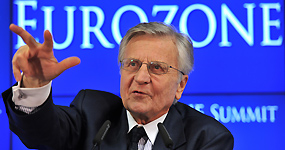
眼下,欧洲正处于紧要关头,这可能不仅关乎欧元的存亡,更关乎全球经济是否会再次陷入混乱。
当前应对希腊债务危机的策略并未奏效。市场已作出了自己的判断:投机分子获得了一次机会,而他们抓住了它。这一点毋庸置疑:欧洲迄今所采取的应对措施,加剧了欧元前景的不确定性。“病毒”已经从欧洲外围国家蔓延到西班牙和意大利等核心国家。
但与其说这是一个经济问题,不如说是一个政治问题。欧洲比较幸运,大多数外围国家的政府都很负责任,并没有采取民粹主义立场。希腊总理乔治•帕潘德里欧(George Papandreou)过去18个月里的表现确实可圈可点——这几乎已是人们所能期望的最佳水平。但至少在一个成员国——或许将来还会有其它国家——总有一些不那么负责任的政客正伺机而动,利用时下流行(有时候也有些道理)的观点做文章——这些观点认为,欧洲没有做应做之事,并强行施加了在政治上令人无法接受的条件。
欧洲应该做些什么是显而易见的。如果欧洲在所有成员国政府的共同承诺支持下,发行欧洲债券,并向那些需要的国家提供低利率贷款,债务问题就是可以控制的。即使需要一些补贴,欧洲也承受得起——对比一下如果不帮助那些陷入困境的国家会失去什么,人们就知道该如何选择。
一个成功对策的另一项要素是恢复经济增长。目前的不确定性,给银行和银行放贷造成了非常负面的影响。设立一个旨在实现稳定的团结基金,再加上欧洲投资银行(European Investment Bank),可以向陷入困境的国家提供必需的投资。一个面向小企业的循环贷款基金,可以向经检验可靠的企业提供资金,帮助重启增长引擎。
在一定程度上,欧洲的问题是建立货币联盟的后果。这个联盟出发点是好的,但在设计上仍存在缺陷。设计师们曾以为,尽管各国存在显著差异,但只要它们管理好本国债务,一切就都会运转正常。西班牙和爱尔兰在危机前都是盈余国家,债务占国内生产总值(GDP)的比例很低。两国的遭遇都证明了上述逻辑中的谬误。
欧洲正站在悬崖边缘,现在是时候终结边缘政策和无休止的政治纷争了。欧洲央行(ECB)应该认识到,即使一些美国评级机构认为这是一个“信贷事件”,但债务重组意味着希腊债券的安全性已有所提高;如果以前它们可以被当成担保品,那么以后就更应该可以。不客气地讲,不接受希腊债券,就是终结希腊的欧元区成员国地位,会带来各种恶果。欧洲央行还必须认识到,对于许多国家的民众而言,一个私人部门不在其中做出牺牲的协议是不可接受的。但那些主张私人部门参与进来的人必须认识到,私人部门不会愿意接受以前的贷款贬值,它们顶多会接受新贷款采取经风险因素调整后的利率。
凭借欧洲的能力,化解当前这场危机并非难事。这不是一个经济问题,只是一个政治意愿的问题。
本文作者是2001年诺贝尔经济学奖得主、哥伦比亚大学(Columbia University)教授
译者/陈云飞
http://www.ftchinese.com/story/001039732

Today, Europe is at a critical juncture that may determine not only whether the euro will survive, but whether the global economy will be once again plunged into turmoil.
The current strategy for dealing with Greece’s debt difficulties is not working. The market has given its verdict: the speculators have been handed an opportunity, and they have seized it. Of this we can be certain: Europe’s response so far has amplified uncertainty concerning the future of the euro. “Contagion” has now spread from the periphery to the centre, to Spain and Italy.
Yet the problem is not so much economic as political. Europe is lucky that in most of the countries in the periphery, there were responsible governments that did not take populist stands. What George Papandreou has done in the past 18 months has been truly impressive – one could hardly have expected more. But in at least one of the countries – and perhaps in the future, in others – there wait in the wings less responsible politicians who would take advantage of widespread, and sometimes justified, views that Europe has not done what it should and has imposed politically unpalatable conditions.
It is easy to see what should be done. If Europe issues European bonds – supported by the collective commitment of all governments – and passes on low interest rates to those in need, debts are manageable. Even if there were some subsidy, Europe could afford it – compared with what will be lost if it does not assist those countries facing trouble.
The other ingredient of a successful response is restoring growth. The current uncertainty has had an especially adverse effect on banks and bank lending. A solidarity fund for stabilisation could, together with the European Investment Bank, make needed investments in the countries in trouble. A revolving loan fund for small businesses could provide money to proven enterprises, to help restart the engines of growth.
Europe’s problems are partly the result of a well-intentioned but imperfectly conceived monetary union. It was hoped that, in spite of the marked differences, if countries only managed their debts, all would work well. Spain and Ireland, which both had surpluses and low debt to GDP ratios before the crisis, showed the fallacy in this logic.
As Europe stands at the precipice, it is time to end brinkmanship and political squabbles. The European Central Bank should realise that a restructuring, even if some American rating agency deems it a “credit event”, means Greek bonds are safer than they were before; if they were acceptable as collateral before, they should be more acceptable after. Put bluntly, to not accept Greek bonds is to end Greece’s membership in the euro, with all the consequences. The ECB must recognise too that for citizens of many countries, a deal without shared sacrifice by the private sector is unacceptable. But those advocating private sector involvement need to realise that the private sector will be reluctant to take a haircut on old loans, and will refuse to accept less than a risk-adjusted interest rate on new.
Resolving this crisis is easily within Europe’s grasp. It is not a matter of economics. It is only a matter of political will.
The writer is a recipient of the 2001 Nobel Memorial Prize in Economics and professor at Columbia University
没有评论:
发表评论